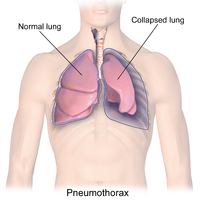
Photo from wikipedia
BACKGROUND Although inspiratory muscle training reduces dyspnea in patients with chronic respiratory diseases, it was not yet evaluated in a sample composed exclusively of patients with interstitial lung diseases. OBJECTIVE… Click to show full abstract
BACKGROUND Although inspiratory muscle training reduces dyspnea in patients with chronic respiratory diseases, it was not yet evaluated in a sample composed exclusively of patients with interstitial lung diseases. OBJECTIVE To discuss the perception of patients with interstitial lung diseases about inspiratory muscle training intervention. METHODS This is a qualitative study. Data were collected using semi-structured interviews, transcribed, and analyzed by thematic analysis. RESULTS Fourteen patients (64 ± 7 years) with interstitial lung disease were interviewed. Average participation in the inspiratory muscle training program was 90% (range, 66-100%). Three themes were elaborated: 1) dyspnea and other symptoms in daily life (e.g. "I could not carry out a bag; I was very uncomfortable"); 2) less symptom and greater performance (e.g. "I wash and change my clothes, house cleaning, do everything without feeling anything"); and 3) IMT: a time dedicated to my health (e.g. "For me it was great because I saw my evolution every day"). CONCLUSION Patients noticed improvements in symptoms and performance related to daily activities. Despite initial difficulties, patients continued training as planned.
Journal Title: Physiotherapy theory and practice
Year Published: 2022
Link to full text (if available)
Share on Social Media: Sign Up to like & get
recommendations!